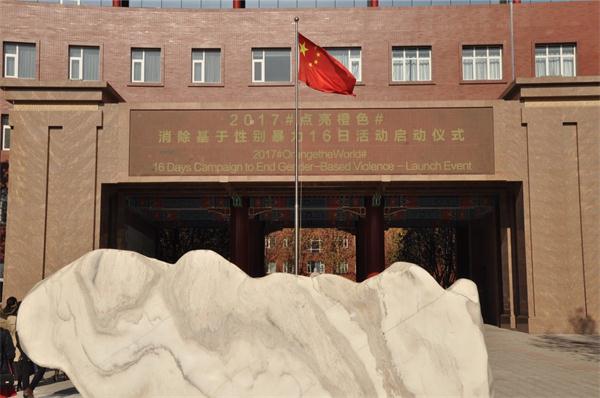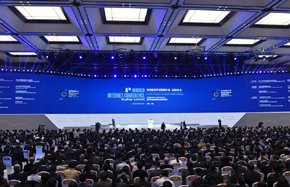'Orange the World': Enlightening Youths on the Reality of Gender Inequality

On November 24th, UN Women jumpstarted the 2017 #OrangetheWorld campaign with a bang. The 'Orange the World' awareness campaign spans 16 days, wherein individuals and groups alike are encouraged to spread information and awareness about gender-based violence. Awareness about gender inequality and the violence so often perpetuated against women and girls is paramount in the fight to bring an end to these issues.
With over 7 billion people on the planet, of which young people under the age of 25 compose up to 43 percent, it becomes obvious that the solution going forward begins with raising awareness among young people. The 'Orange the World' campaign strives to do just that; it seeks to take advantage of the world of social media and technology that these young individuals currently inhabit, to allow them to recognize and support the fight against gender inequality and gender-based violence.
The roots of the campaign began in 1999, when the UN General Assembly passed a resolution on December 17, designating November 25th as the 'International Day for the Elimination of Violence against Women and Girls,' and called for people all over the world to come together to prevent and eliminate any form of gender discriminant violence.
While the 16 days campaign has already become quite popular around the world, with netizens from over 90 countries and regions participating in online activities from November 25th through December 10th, the United Nations sought to raise even more awareness, giving way to the 'Orange the World' campaign which lights iconic buildings, streets, workplaces, and schools with orange lights in a show of solidarity to support the cause.
Gathered at Beijing Royal School, Nicholas Rosellini, the United Nations Resident Coordinator in China, Ms. Julie Broussard, Country Program Manager of UN Women China, and Mr. Wang Guangfa, Chairman of Beijing Law and Politics Group, and many other distinguished guests, celebrated the beginning of the 2017 16 Days of Activism with over 800 students and young adults in attendance. The event was centered on its target audience: young people.
The event was organized by over 200 young peer educators and included a variety of student-led performances, skits, dances, songs and speeches. This is undoubtedly the way forward. To have the perspective on young people on issues such as this is invaluable, for it increases awareness among the target audience in ways that no outside group can. During the event, to encourage students to post on social media to raise awareness for the campaign, a young student was called onto the stage to receive a prize for his post on Weibo.
When asked to give a few words about the issue, the shy boy's words were suddenly filled with conviction – "I whole-heartedly support this event and everything we have learned here today, but I cannot help but emphasize that we shouldn't be posting on social media for the sake of posting or for gaining followers. Activism for activism's sake is useless. If we are able to help at least one person or stranger by our side in real life, to approach someone with an understanding and a gentle hand, I think only then will there be real change."
Young people are the future and with students such as these, the path forward to gender equality in China seems bright. This is indicative of China's steps towards equality and towards ending gender-based violence. With passing its first national law against domestic violence, it has already begun to set the gears in motion for a better future for women and girls everywhere. However, there are challenges on the road ahead that will be difficult to overcome.
Ms. Julie Broussard, Country Program Manager of UN Women China, said in an exclusive interview with China News Daily that, "The way of thinking in China is very strong on maintaining the solidarity of the group, the family, the society, is paramount. What needs to happen is for people to realize that when one person in the group is suffering, then the whole group is suffering. That full realization has not come about yet; it has started and we can see that when people talk about violence and the fact that more cases are reported in the media, but it is a 20 year transformation that we can see in other countries, and it will be the same here."
Since November 2015, UN Women, Beijing Normal University and Beijing Royal School have jointly launched a three-year 'Peer Leadership for Healthy Relationships Program.' The project is the first pilot project to promote gender equality and prevent gender-based violence in China's secondary education sector. This allows young people to learn first hand about gender inequality and violence against women that is vital to a long-term solution.
The project also further emphasizes the use of social media to spread awareness about the cause. Be it donning orange clothing or an orange scarf and posting about one's support for gender equality, or perhaps snapping a picture of the UN Headquarters and many other orange-lit landmarks – the role that social media has to play moving forward is absolute.
When asked if China might see a trending tag like #MeToo in the United States and overseas as a show of solidarity among women and victims of assault and a way to raise awareness about the issue, Ms. Broussard states, "I suspect that is a few years in the future for China. I don't think the Chinese public is quite ready for that yet. One reason is that the stigma against victim here is a bit stronger. It is very hard for a victim here to come forward because she will face a lot of stigma not only from the perpetrator but sometimes from her own family. They will not support her speaking out and that is very hard when you face that level of condemnation."
While social media and young people are the future of true gender equality in China, the present is marked with both successes and challenges. The first step has been taken at Beijing Normal University and at Beijing Royal School and one hopes that other pilots and campaigns such as this will gain traction is a multitude of schools in China, regardless of city, size, or level of prestige. The road forward for China to attain gender equality is long but there is no doubt that China, with the support of the United Nations and its young people, will overcome the challenges to come.





















